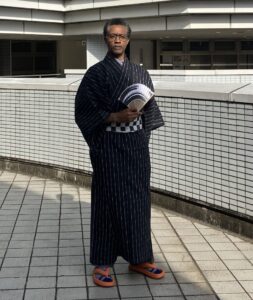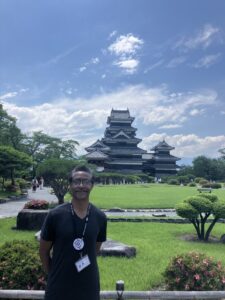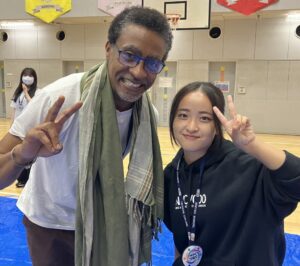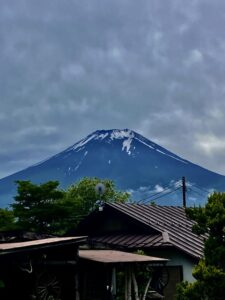Professor Seth Markle, Associate Professor of History and International Studies, Visits Japan
 You served as the faculty advisor for the Technos International Week and its yearly trip to Japan, could you how you came to be involved in the program?
You served as the faculty advisor for the Technos International Week and its yearly trip to Japan, could you how you came to be involved in the program?
Each year a call for applications is sent out via email to all faculty and staff as well as students. I applied, framing my application in the context of my teaching and research interests of Hip Hop history and culture, having an interest in exploring Japan through that lens, hoped for the best, telling myself the worst thing they can say is ‘No’, which wouldn’t be the end of the world. I was really surprised and overjoyed when I learned I was accepted!
Did the trip tie into your teaching here at Trinity or any research you do or alternatively broaden your thinking in an area you are less familiar with?
As a result of tailoring my application in a way that spoke to my teaching and research interests, I was able to curate a travel experience that spoke to my work as a Hip Hop historian, scholar, and cultural organizer. For example, one thing I was interested in was the function and meaning of vinyl culture in Tokyo and how it is being preserved and celebrated in this digital age. Japan is well known for its love of vinyl records, so I visited several record shops like Coconut Disc and Tower Records, digging into the endless crates of African American and Japanese jazz music from the 1960s and 1970s. Through my connection with a DJ based in New York City, I was also able to link up and attend a Hip Hop party hosted by a prominent Japanese DJ named DJ Sarasa. This event gave me the chance to meet and talk with a lot of local and expatriate artists, designers, and marketing executives working for big-name brands like Adidas and Nike. I also snapped over 100 photographs of graffiti art throughout the city and ended up publishing a photo essay/blog post for the Trinity Hip Hop Festival website, which anyone access HERE.
I hope to incorporate Japan’s Hip Hop story into my course “INTS 344: Global Hip Hop Culture” in the coming future.
 How do you hope to promote the program to the Trinity community as a whole?
How do you hope to promote the program to the Trinity community as a whole?
Given my role as the faculty advisor to the Trinity International Hip Hop Festival, I thought that the best way to promote Japanese culture on campus and in the city of Hartford would be by featuring Japanese Hip Hop artists at the 19th Trinity International Hip Hop Festival. Scheduled for April 18-19, 2025, we intend to bring Coma-Chi and Asuka Koto to the college for a performance, panel discussion, and class visits to Japanese language classes. Coma-Chi is a trailblazing emcee from Tokyo, whose influence helped define the early days of the Japanese Hip Hop movement. Asuka Koto is a distinguished Koto musician and one of the most accomplished young artists in Japanese traditional music today.
Here are some links that may be of interest.
Do you have a favorite moment/day/city etc. that you will remember when looking back at this trip? 
There were so many moments that will stay with me forever. I enjoyed meeting the faculty and students of Technos College as well as the other students from the sister schools like Bates College and Carleton College (USA), the Aukland Institute of Technology in New Zealand, and Pembroke College in the United Kingdom. The calligraphy workshop was particularly memorable because of its connection to contemporary Hip Hop graffiti writing. However, if I were to pick just one moment then that would be attending a jazz concert with my close friend and colleague Professor Jeff Bayliss, formerly of the History Department here at Trinity. He has been living and teaching in Tokyo since 2023. While we met up and toured the city on several occasions during my free time, I was blown away by the sound and artistry of the alternative Japanese jazz band Virtual Silence who performed at a legendary jazz club in Shinjuku called the Pitt Inn.
You have visited numerous continents/countries as part of your academic research, what made Japan unique?
Having only visited for two weeks, I am reluctant to draw any solid conclusions about the country’s uniqueness because I saw a lot of similarities with other countries that I’ve visited. The hospitality I was shown by strangers I would meet at a restaurant or in a Seven-Eleven was not that different from the Tanzanian hospitality I’m so accustomed to. One time a Japanese woman who owned a sushi bar that I frequented and struck up a conversation with using Google Translate gifted me an intricately designed ramen noodle bowl and chopsticks. The same could be said about the extent to which African American culture has been globalized, packaged, and consumed by today’s urban youth generation and the vibrant nightlife and organized chaos of a mega city. There is something unique, however, about the way tradition and modernity co-exist in a far more symbiotic fashion. 
